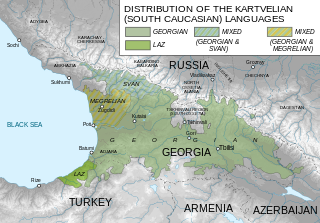
Pharnavaz I was a king of Kartli, an ancient Georgian kingdom known as Iberia in the classical antiquity. The Georgian Chronicles credits him with being the first monarch founding the kingship of Kartli and the Pharnavazid dynasty, while other independent chronicles, The Conversion of Kartli makes him the second Georgian monarch. Based on the medieval evidence, most scholars locate Pharnavaz’s rule in the 3rd century BC: 302–237 BC according to Prince Vakhushti of Kartli, 299–234 BC according to Cyril Toumanoff and 284–219 BC according to Pavle Ingoroqva. Pharnavaz's rise and the advent of the Iberian monarchy was directly tied to the victory of Alexander the Great over the Achaemenid Empire.

Shida Kartli is a landlocked administrative region (Mkhare) in eastern Georgia. Comprises a central part of the historical-geographic province of Shida Kartli. With an area of 5,729 square kilometres, Shida Kartli is the 8th largest Georgian region by land area. With 300,382 inhabitants, it is Georgia's seventh-most-populous region. Shida Kartli's capital and largest city, Gori, is the 5th largest city in Georgia.

Kakheti is a region (mkhare) formed in the 1990s in eastern Georgia from the historical province of Kakheti and the small, mountainous province of Tusheti. Telavi is its capital. The region comprises eight administrative districts: Telavi, Gurjaani, Qvareli, Sagarejo, Dedoplistsqaro, Signagi, Lagodekhi and Akhmeta. Kakheti is bordered by the Russian Federation to the Northeast, Azerbaijan to the Southeast, and Mtskheta-Mtianeti and Kvemo Kartli to the west. Kakheti has a strong linguistic and cultural identity, since its ethnographic subgroup of Kakhetians speak Kakhetian dialect.

Vakhtang V born Bakhuta Mukhranbatoni was the King of Kartli from 1658 until his death, who ruled as a vassal wali for the Persian shah. He is also known under the name of Shah Nawaz, which he assumed on being obliged outwardly to conform to Islam.
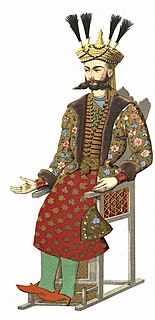
Constantine II, of the Bagrationi dynasty, was a king of Georgia since 1478. Early in the 1490s, he had to recognise the independence of his rival rulers of Imereti and Kakheti, and to confine his power to Kartli. In 1505, Constantine II died, and was succeeded by his son David X.

Levan, also known by his Muslim name Shah-Qoli Khan was a Georgian royal prince (batonishvili) and the fourth son of the king of Kartli Shahnawaz. He was a titular king of Kartli in 1709.
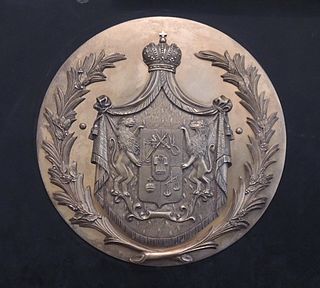
The Bagrationi dynasty is a royal dynasty which reigned in Georgia from the Middle Ages until the early 19th century, being among the oldest extant Christian ruling dynasties in the world. In modern usage, the name of the dynasty is sometimes Hellenized and referred to as the Georgian Bagratids, also known in English as the Bagrations.
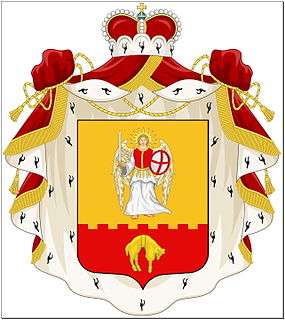
The Amilkhvari was a noble house of Georgia which rose to prominence in the fifteenth century and held a large fiefdom in central Georgia until the Imperial Russian annexation of the country in 1801. They were hereditary marshals (amilakhvar/amilakhor) of Georgia from c. 1433, from which the family takes its name. Subsequently, the family was received among the princes (knyaz) of the Empire under the name of Amilakhvarov and Amilakhvari.

The Second Kingdom of Kakheti was a late medieval/early modern monarchy in eastern Georgia, centered at the province of Kakheti, with its capital first at Gremi and then at Telavi. It emerged in the process of a tripartite division of the Kingdom of Georgia in 1465 and existed, with several brief intermissions, until 1762 when Kakheti and the neighboring Georgian kingdom of Kartli were merged through a dynastic succession under the Kakhetian branch of the Bagrationi dynasty. Through most of its turbulent history, Kakheti was tributary to the Persians, whose efforts to keep the reluctant Georgian kingdom within its sphere of influence resulted in a series of military conflicts and deportations.
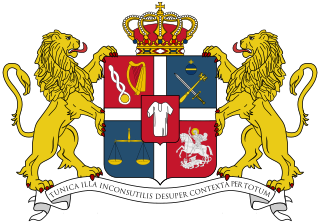
The House of Mukhrani is a Georgian family, a branch of the former royal dynasty of Bagrationi from which it sprang early in the 16th century, and received in appanage the domain of Mukhrani located in Kartli, central Georgia. The family has since been known as Mukhran-Batoni, that is, "Princes (batoni) of Mukhrani".

The Tsitsishvili is a Georgian noble family, with several notable members from the 15th century through the 20th.
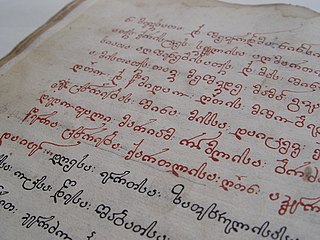
The Georgian Chronicles is a conventional English name for the principal compendium of medieval Georgian historical texts, natively known as Kartlis Tskhovreba, literally "Life of Kartli", Kartli being a core region of ancient and medieval Georgia, known to the Classical and Byzantine authors as Iberia.

The Kingdom of Kartli was a late medieval/early modern monarchy in eastern Georgia, centered at the province of Kartli, with its capital at Tbilisi. It emerged in the process of a tripartite division of the Kingdom of Georgia in 1478 and existed, with several brief intermissions, until 1762 when Karti and the neighboring Georgian kingdom of Kakheti were merged through a dynastic succession under the Kakhetian branch of the Bagrationi dynasty. Through much of this period of time the kingdom was a vassal of the successive dynasties of Iran, but enjoyed intermittent periods of greater independence, especially after 1747.
The Surameli were a noble family in the medieval Kingdom of Georgia, with notable members from the 12th century to the 14th. At the height of their influence and prestige in the 13th century, the Surameli were hereditary eristavi ("duke") of Kartli and msakhurt-ukhutsesi of Georgia.
This article lists Georgian monarchs, and includes monarchs of various Georgian kingdoms and the British monarchs of the Georgian era.

The Largvisi Monastery is a medieval Georgian Orthodox monastic foundation at the village of Largvisi in the Ksani river valley in the Akhalgori Municipality, what is now the disputed territory of South Ossetia. The monastery is documented from the early 14th century. The extant church, a domed cross-in-square design, dates to 1759. It was a familial abbey of the Kvenipneveli dynasty, Dukes of Ksani and one of the leading noble families of the Kingdom of Kartli.
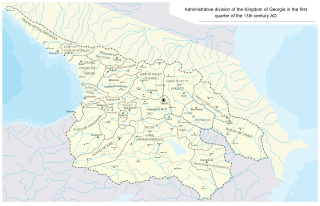
The Duchy of Kartli was a duchy (saeristavo) in a mediaeval Georgia. Its capital was lcoated in Uplistsikhe.
